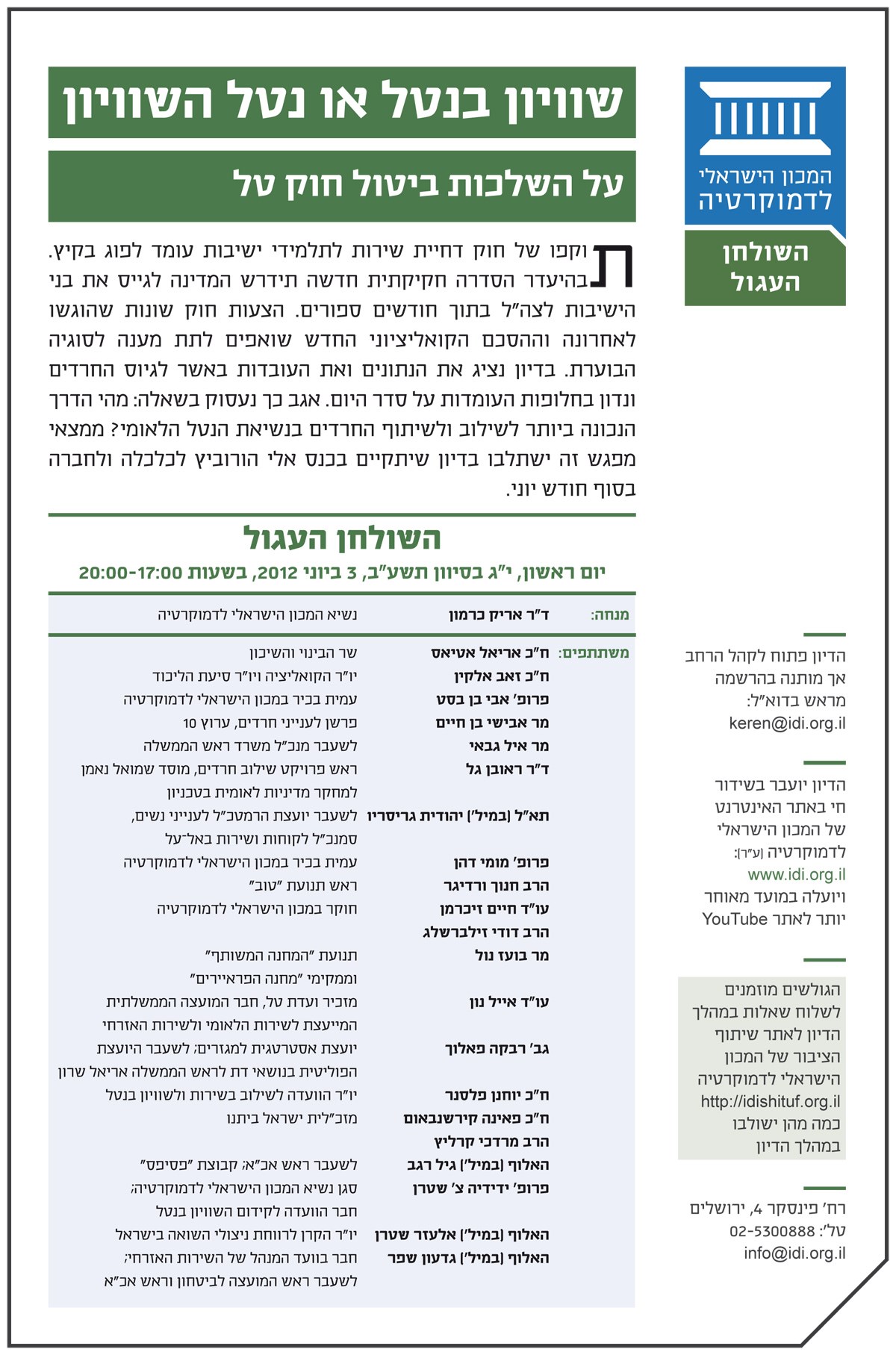An Equal Burden or the Burden of Equality? Roundtable on Alternatives to the Tal Law
Israel Democracy Index
The Tal Law, which exempts full time yeshiva students from army service, will expire this summer, and a recent Supreme Court ruling has determined that it may not be extended any further. Without a new legislative arrangement, within a matter of months, the state will be required to draft all ultra-Orthodox yeshiva students into the Israel Defense Forces.
Knesset members from across the political spectrum have recently submitted a variety of bills designed to regulate the conscription of Haredi yeshiva students. In addition, the new coalition agreement contains a commitment that new legislation to resolve this burning issue will be passed within two and a half months. To this end, a government committee has been established under the leadership of MK Yohanan Plesner. IDI Vice President of Research Prof. Yedidia Stern is one of the experts on this committee.
What are the implications of drafting yeshiva students to the IDF? What are the alternatives to the Tal Law? On Sunday June 3, 2012, IDI's George Shultz Roundtable Forum convened a panel of experts to analyze the proposed alternatives, explore the social, economic, security, and legal implications of each, and arrive at recommendations.
This roundtable discussion was a prelude to the session on alternatives to the Tal Law that took place as part of IDI's Eli Hurvitz Conference on Economy and Society (formerly the Caesarea Economic Policy Planning Forum), which took place on June 27-28, 2012.
Moderator: Dr. Arye Carmon, President, The Israel Democracy Institute
- Minister Ariel Atias, Minister of Housing and Construction (Shas)
- Prof. Avi Ben-Bassat, Senior Fellow, The Israel Democracy Institute; Economist, The Hebrew University of Jerusalem
- Mr. Avishai Ben Haim, Ultra-Orthodox Affairs Commentator, Channel 10
- Prof. Momi Dahan, Senior Fellow, The Israel Democracy Institute
- MK Zeev Elkin, Chair of the Coalition and Likud Chairman
- Mr. Eyal Gabbai, Former Director-General of the Prime Minister's Office
- Dr. Reuven Gal, Head of the Orthodox Integration Project at the Samuel Neaman Institute for National Policy of the Technion
- Rabbi Mordechai Karelitz, Former Mayor of Bnei Brak
- MK Faina Kirshenbaum, Secretary General, Yisrael Beiteinu
- Mr. Boaz Nol, representative of the "Common Denominator" and "Camp Sucker" protest movements
- Attorney Eyal Nun, Secretary of the Tal Committee; Member of the Government Council for National Civil Service
- Rivka Paluch, Strategic Consultant on Minorities; Ariel Sharon's liaison to rabbis and religious parties
- MK Yohanan Plesner, Chair of the government committee established to propose an alternative to the Tal Law
- Major General (Ret.) Gil Regev, The "Mosaic" Group; Former Head of the IDF Manpower Directorate
- General (Ret.) Gideon Sheffer, Vice President, Elbit Systems Strategic Planning
- Major General (Ret.) Elazar Stern, Chair, The Foundation for the Benefit of Holocaust Victims in Israel; Former Head of the IDF Manpower Directorate
- Prof. Yedidia Z. Stern, Vice President of Research, The Israel Democracy Institute; Member of the government committee established to propose an alternative to the Tal Law
- Major General (Ret.) Gil Regev, The "Mosaic" Group; Former Head of the IDF Manpower Directorate
- Rabbi Hanoch Werdiger, Founder of the "Tov" political organization
- Attorney Haim Zicherman, Researcher, The Israel Democracy Institute
- Rabbi David (Dudi) Zilbershlag, Journalist, Founder of Meir Panim

